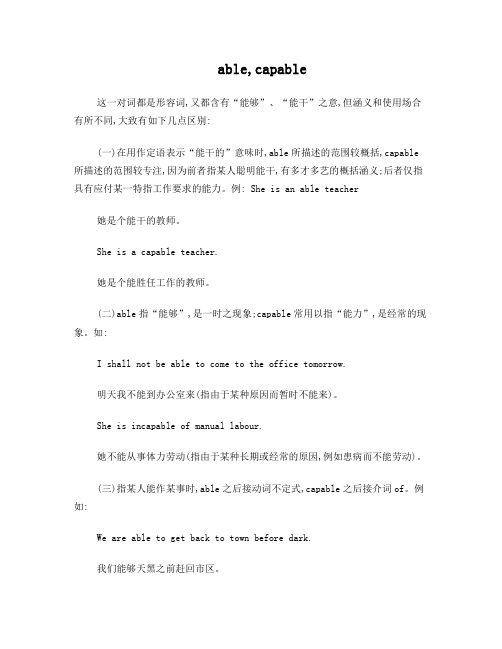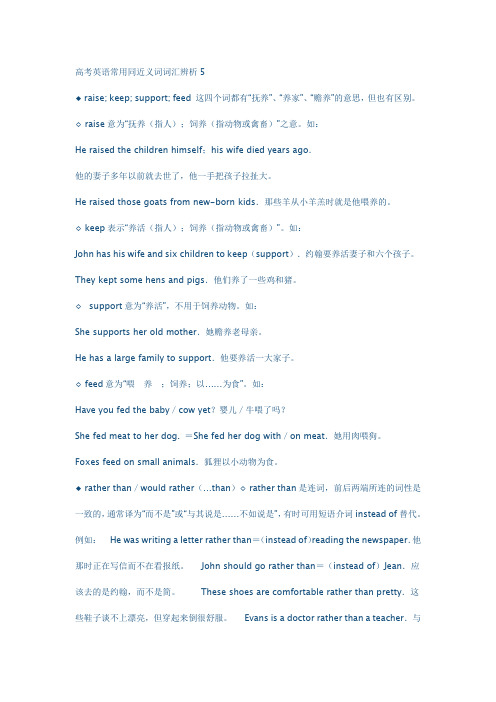高考英语常用同义词辨析汇总
英语常用同义词辨析

英语常用同义词辨析habit, custom, manners, usage, practice, convention, tradition这些名词均含有“习惯,风俗,传统”之意。
habit〓侧重于自然养成的,不易去掉的个人习惯。
custom〓指一个国家、一个民族、一个地区或一个社会的习惯、行为方式或风俗习惯。
也可指个人的习惯。
manners〓指在某一时期或某一团体中盛行的社会礼仪或社会风俗模式。
usage〓指持续时间长,为很多人公认采纳的惯例、习俗。
practice〓常指习惯性的做法或行为。
convention〓多指约定俗成的行为方式规则或公认的标准,或指艺术上公认的技巧。
tradition〓广义指世代相传的伦理、行为规范和生活方式,特指因长久奉行而几乎具有法律效力的习惯、习俗,侧重历史意义。
hang, suspend这两个动词均含“挂,吊”之意。
hang〓通常指一端固定于一点或一条线上,另一端悬于空中的状态。
suspend〓侧重悬挂物支撑点的灵活性和活动自由。
happen, occur, chance, take place这些词语都可表示“发生”之意。
happen〓普通用词,泛指一切客观事物或情况的发生,强调动作的偶然性。
occur〓较正式用词,可指意外地发生,也可指意料中的发生。
chance〓侧重事前无安排或无准备而发生的事,特指巧合。
take place〓多指通过人为安排的发生。
happy, glad, cheerful, joyful, merry, delightful, gay, pleasant, nice, jolly, agreeable这些形容词均含“愉快的,高兴的”之意。
happy〓侧重感到满足、幸福或高兴。
glad〓最普通用词,语气较弱,表示礼貌的惯用语。
指乐于做某事或因某事而感到满足,常表愉快的心情。
cheerful〓多指因内心的愉快而表现出兴高采烈,是强调而自然的感情流露。
高考英语相似词语辨析

able,capable这一对词都是形容词,又都含有“能够”、“能干”之意,但涵义和使用场合有所不同,大致有如下几点区别:(一)在用作定语表示“能干的”意味时,able所描述的范围较概括,capable 所描述的范围较专注,因为前者指某人聪明能干,有多才多艺的概括涵义;后者仅指具有应付某一特指工作要求的能力。
例: She is an able teacher她是个能干的教师。
She is a capable teacher.她是个能胜任工作的教师。
(二)able指“能够”,是一时之现象;capable常用以指“能力”,是经常的现象。
如:I shall not be able to come to the office tomorrow.明天我不能到办公室来(指由于某种原因而暂时不能来)。
She is incapable of manual labour.她不能从事体力劳动(指由于某种长期或经常的原因,例如患病而不能劳动)。
(三)指某人能作某事时,able之后接动词不定式,capable之后接介词of。
例如:We are able to get back to town before dark.我们能够天黑之前赶回市区。
They are not capable of doing the work.他们没有能力做这件工作。
(四)capable除表示“有能力的”意味外,还可用以表示“有可能的”涵义,able则没有这个用法。
如:The situation is capable of improvement.此情况有可能好转。
That oil tanker is capable of being restored.那艘油轮有可能修好。
请注意,下列句中的able是用错了,应改为capable:This book is able to be translated.(错)This book is capable of being translated.(对)That law is able to be evaded.(错)That law is capable of being evaded.(对)(五)able 一般用作正面意义,指好人好事;capable 则是中性词,既可指好事,亦可指坏事,例如在下例中, capable of anything是表示“任何坏事都做得出来”之意:That guy is capable of anything!那家伙什么勾当都会干得出来!(六)able的反义词是unable;capable的反义词是incapable。
高中英语必修一同义词辨析分析

2.ignore/neglect/overlook 这一组动词都有"忽略"的意思。 ignore v.忽视,不理睬,指有意识地拒绝。 neglect v.忽视,忽略,疏忽,指无意识地忽视或忘记。
overlook v.忽略,疏漏,指有意识地遗漏,也可以指无意识地忽略。
3.Cheat/ fool 均含有“欺骗”之意。 cheat: 普通用词,指用蒙蔽他人的手段取得所需之物, 尤多指在赢利的买卖中欺骗人。 fool: 指把别人当傻瓜,愚弄欺骗别人
3.rise, raise, lift
这些动词均有“上升,举起”之意。 rise :普通用词,指具体的或抽象的事物由低向高移动。 The moon has not yet risen. 月亮还没有升起。
raise :及物动词,常用词,多指把某物从低处升到高处,有时作引申用。 All the students raised their hands.
必修一Unit1
1.calm/quiet/still/silent calm主要是用于指气候、海洋等风平浪静的。也 可指人,表示安静的镇静的。 quiet 指没有吵闹声的、没有噪音的。它强调声音 很小、很低或全无声音。 still 可以指环境的安静,也可以指姿势保持一动 不动。 silent 强调不发表意见,也可指“寂静”,强调没 有声音或沉默不语。
2.award,reward
这两个词都可以用作名词和动词,作名词时,意义相近,但不是同义词。 1、作名词时,award的意思是“奖品”、“奖金”,其义与prize近似,两者 都指因为作出杰出成就而受奖。. reward作名词时,其意为“赏金”、“酬金”或一些非金钱的报酬。 2、用作动词时,award的意思是“授予”、“颁发”、“判给”;reward则 表示“报答”、“酬谢”之意。
英语 常用同义词辨析

Synonym DiscriminationPart I1.abandon, desert, forsake, leave, give up这些动词或词组均含“抛弃、放弃”之意。
abandon:强调彻底地、完全地放弃某种打算、计划、希望、意见、主张,或职业、地位,亲友、妻室。
Eg: He abandoned all hopes of success. The heartless man abandoned his wife and children although they had no friends to take care of.desert:着重指违背法律责任和义务,或自己的信仰与誓言的行为,多含非难的意味。
Eg: Don’t desert me in the misfortune.forsake:侧重断绝感情上的依恋,自愿抛弃所喜欢的人或物。
也指抛弃信仰或改掉恶习。
Eg: His wife persuaded him to forsake his drinking habits.leave:普通用词,指舍弃某事或某一职业,或终止同一某人的关系,但不涉及动机与果。
give up:普通用语,侧重指没有希望或因外界压力而放弃。
relinquish:不愿意放弃,但又不得不放弃。
常用来表示放弃某种习惯,某种舍不得放弃的职业、计划、希望、信念、权利、要求等。
A parent relinquishes control over grown children.2. ability, capacity, capability, genius, talent, competence, faculty, gift, aptitude这些名词均可表示人的“能力,才能”之意。
ability:普通用词,指人先天的或学来的各种能力。
复数通常只指智力方面的才能。
capacity:侧重指人的潜在能力(capacities),通常不指体力,多指才智,尤指接受与领悟能力。
英语完形填空高考备考----词汇(同义词辨析)

高中常用同义词辨析汇总1. a good/great many(of)/a number of/a large quantity of/plenty of/a large amount of/a great deal of2. a number of/numbers of/the number of. . .3. abandon/desert4. abolish/cancel5. above all/first of all/at first6. accuse/charge/blame/scold7. acquire/obtain/gain/win/earn8. adjust/adapt9. adopt/adapt10. agreement/contract/bargain11. also/too/either/as well/besides/moreover12. anxious/eager/keen13. apart from/except/except for/except that/besides14. argue/debate/discuss/quarrel15. ashamed/shameful/shame16. at ease/with ease17. attempt/try/manage18. attend/join/join in/take part in/participate in19. average/common/ordinary/general/usual20. award/reward/prize21. beat/strike/hit22. because of/owing to/thanks to/due to23. before/since/until24. blame/condemn/scold25. bother/interrupt/trouble/disturb26. break into/break in27. burden/load28. calm/still/quiet/silent29. care about/care for30. cause/reason31. celebrate/congratulate/observe32. certain/sure33. choose/select/elect/pick34. close/closely35. come about/happen/take place/occur/break out36. come to power/be in powere true/realize38. common/ordinary/usual/average/universal39. compare/contrast40. conflict/fight/war/struggle41. confuse/puzzle42. consequently/so43. considerate/thoughtful44. constant/continual/continuousv1.0 可编辑可修改continuous adj. 不停的,连续不断的。
高考英语常用同义词辨析

高考英语常用同义词辨析英语中存在很多意义相近的单词或短语,而它们也给精准用词带来了障碍。
我们可以通过辨析来正确理解它们的异同,体会它们之间的细微差别,从而达到能够正确运用的目的。
下面小编就带大家一起来看几组近义词,看看它们有什么不同。
1wage/pay/salary:以上各词均指收入、工资、薪水。
e.g.a weekly wage of$200周薪200美元Her job is hard work,but the pay is good.她工作虽辛苦,但薪水不低。
His annual salary is just under$48,000.他的年薪将近48,000美元。
2look/glance/stare/glare/gaze/glimpse:以上各词均表示看的意思。
e.g.Here,have a look at this.来,看一看这个。
She stole a glance at her watch.她偷偷看了看表。
She gave the officer a blank stare and shrugged her shoulders.她面无表情地盯着那个军官,耸了耸肩。
She fixed her questioner with a hostile glare.她带着敌意瞪着向她提问的人。
She felt embarrassed under his steady gaze.她在他凝视的目光下感到很尴尬。
He caught a glimpse of her in the crowd.他在人群里一眼瞥见了她。
3recommend/advise/advocate/urge:以上各词均含劝告、建议之义。
e.g.We’d recommend you to book your flight early.我们建议你早点儿预订航班。
I’d advise you not to tell him.我劝你别告诉他。
高考英语写作常用同义词辨析基础版

这些形容词均含“稀罕的,很少发生”之意。
occasional: 指偶然、不时或间或发生的事,侧重无规律可循。
uncommon: 指一般不发生或很少发生的事情,故显得独特、异常与例外。
scare: 指暂时不易发现、不存在或数量不足,供不应求的东西。
这些形容词均含“新的”之意。
new: 普通用词,与old相对,指最近的或创新的。
fresh: 指新鲜的、新做的,侧重创新。
novel: 侧重新事物的新奇和独特。
original: 强调独创性。
innovative: 强调富有创新和革新精神。
news, information, intelligence
note语气比notice强,指不仅注意到,而且记录下来,侧重注意的认真与仔细。
mind: 指用心地去观察,了解某人或某物以达到某一目的。常用于命令句中。
attend: 一般用词,侧重专心于某事。
remark: 一般指经过思维活动而注意到。
nourish, feed, graze
这些动词均含“提供所需食物,喂养”之意。
officer, official
这两个名词均含“官员”之意。
officer: 主要指军官或警官,有时也的指文职官员或高级职员。
official: 通常指文职官员,公职人员。有时也指军官或警官。
onlyቤተ መጻሕፍቲ ባይዱ single, sole, unique, alone
这些形容词均可表示“唯一的”之意。
nurse: 通常指对无力自顾的婴儿、病人等进行照料或护理。
tend: 指出于责任心、博爱心而不是私人感情去对人或物进行照顾。
高考英语常用同近义词词汇辨析5

高考英语常用同近义词词汇辨析5◆ raise; keep; support; feed 这四个词都有“抚养”、“养家”、“赡养”的意思,但也有区别。
◇ raise意为“抚养(指人);饲养(指动物或禽畜)”之意。
如:He raised the children himself;his wife died years ago.他的妻子多年以前就去世了,他一手把孩子拉扯大。
He raised those goats from new-born kids.那些羊从小羊羔时就是他喂养的。
◇ kee p表示“养活(指人);饲养(指动物或禽畜)”。
如:John has his wife and six children to keep(support).约翰要养活妻子和六个孩子。
They kept some hens and pigs.他们养了一些鸡和猪。
◇support意为“养活”,不用于饲养动物。
如:She supports her old mother.她赡养老母亲。
He has a large family to support.他要养活一大家子。
◇ feed意为“喂 养;饲养;以……为食”。
如:Have you fed the baby/cow yet?婴儿/牛喂了吗?She fed meat to her dog. =She fed her dog with/on meat.她用肉喂狗。
Foxes feed on small animals.狐狸以小动物为食。
◆ rather than/would rather(…than)◇ rather than是连词,前后两端所连的词性是一致的,通常译为“而不是”或“与其说是……不如说是”,有时可用短语介词instead of替代。
例如:He was writing a letter rather than=(instead of)reading the newspaper.他那时正在写信而不在看报纸。
- 1、下载文档前请自行甄别文档内容的完整性,平台不提供额外的编辑、内容补充、找答案等附加服务。
- 2、"仅部分预览"的文档,不可在线预览部分如存在完整性等问题,可反馈申请退款(可完整预览的文档不适用该条件!)。
- 3、如文档侵犯您的权益,请联系客服反馈,我们会尽快为您处理(人工客服工作时间:9:00-18:30)。
高考英语常用同义词辨析汇总1. a good/great many(of)/a number of/a large quantity of/plenty of/a large amount of/a great deal of2. a number of/numbers of/the number of. . .3. abandon/desert4. abolish/cancel5. above all/first of all/at first6. accuse/charge/blame/scold7. acquire/obtain/gain/win/earn8. adjust/adapt9. adopt/adapt10. agreement/contract/bargain11. also/too/either/as well/besides/moreover12. anxious/eager/keen13. apart from/except/except for/except that/besides14. argue/debate/discuss/quarrel15. ashamed/shameful/shame16. at ease/with ease17. attempt/try/manage18. attend/join/join in/take part in/participate in19. average/common/ordinary/general/usual20. award/reward/prize21. beat/strike/hit22. because of/owing to/thanks to/due to23. before/since/until24. blame/condemn/scold25. bother/interrupt/trouble/disturb26. break into/break in27. burden/load28. calm/still/quiet/silent29. care about/care for30. cause/reason31. celebrate/congratulate/observe32. certain/sure33. choose/select/elect/pick34. close/closely35. come about/happen/take place/occur/break out36. come to power/be in powere true/realize38. common/ordinary/usual/average/universal39. compare/contrast40. conflict/fight/war/struggle41. confuse/puzzle42. consequently/so43. considerate/thoughtfulthoughtful 指为他人着想,主动关怀,做有益于他人的事。
44. constant/continual/continuousconstant adj. 不断的,经常的。
强调始终如一地经常出现。
continual adj. 连续不断的,频繁的。
表示时断时续地发生。
continuous adj. 不停的,连续不断的。
强调中间不停顿。
45. consult/look upconsult意为“查阅书籍等以获得信息”,其宾语一般是dictionary, book,magazine, telephone, directory, map, railway, guide等名词。
look up 意为“在词典或其他工具书中查找某信息”,其宾语为需要查找的内容,如word, phrase, idiom, slang, proverb, phone number, place, name等名词或短语。
46. contain/include/holdcontain意为“包含,含有,容纳,里面装有”,指的是包含的全部内容或容量,也可指里面所含的成分,一般不用于进行时态。
include通常表示把某事物作为其中的一部分包含在内。
在句中常构成分词短语sth. included或including sth. 。
hold通常指有能力容纳。
/ 47. content/satisfactory48. contribute/devote49. convey/transport50. cope with/deal with/do with51. create/invent/discover52. cure/treat/heal53. deal with/do with54. declare/announce/claim55. decline/refuse/reject56. defeat/beat/win/conquer57. defend/guard/protect58. demand/require/request59. determine to do/be determined to do60. direct/directly61. disturb/interrupt62. divide(into)/separate(from)63. dress/wear/put/pull on/have on64. employ/hire/rent65. empty/vacant66. energy/force/power/strength67. ensure/assure/insure68. ensure/guarantee/promise69. escape/flee70. examine/check/test/inspect71. expand/extend/spread/stretch72. expense/cost/price/fee/ charge /fare73. expose/uncover74. fault/mistake/wrong75. fit/suitable/proper/appropriate76. fit/suit/match77. force/strength/energy/power78. forgive/excuse79. gain/earn/get/win80. gather/collect81. give in/give up如“give it in”。
表示“放弃(希望);不再做(某事);把……献给”的意思,作及物give up动词短语用,其后接名词或动词-ing形式作宾语。
82. give out/(sth. ) run out/(sb. ) run out of sth. /(sb. ) use up sth.表示“用尽, 耗光”时多用作不及物动词短语, 不用被动形give out式。
不及物动词短语, 没有被动语态。
主语多为时间、金钱、(sth. ) run out食物等。
(sb. ) run out of sth.及物动词短语, 后接宾语。
(sb. ) use up sth.及物动词短语, 有被动语态(sth. ) be used up。
83. glare at/glance at/stare at/look atglare at“瞪眼;怒目而视”。
“匆匆一看,扫视;一瞥;浏览”。
指速度非常快地看一看某人或glance at某物的大体轮廓,或粗略地浏览。
“目不转睛地看,盯着,凝视”。
表示由于害怕、深思或惊吓而张stare at大眼睛看。
look at“看(着)”,指把眼睛转向目标。
84. habit/custom/practice85. ignore/overlook86. imaginative/imaginary87. in addition/besides/except/except for/apart from88. in case/in case of89. in search of/search/search for/search. . . for. . .90. in spite of/despite/though/although/as91. in turn/by turns/in return92. incident/accident/event93. influence/effect/impact/affect94. injure/hurt/wound/harm/damage95. join/participate/take part in/attend96. lead to/lie in97. lie的变化/lay的变化98. likely/possible/probable99. lively/alive/live/living100. look back on sth. /call up101. lost/missing/gone102. make sense/make sense of103. manage/try/attempt104. method/way/means/manner/approach105. on the contrary/on the other hand106. only if/if only107. persuade/advise108. pity/mercy/sympathy109. product/produce/production110. prohibit/forbid/ban111. raise/rise/arise112. real/true113. realize/recognise/know114. regardless of/in spite of115. remove/move116. represent/on behalf of/stand for117. rescue/save118. rob/steal119. ruin/destroy/damage/harm120. scenery/scene/view/sight121. seem/appear122. sensible/sensitive123.124. separate/divide125. set up/found/build/put up126. settle/solve127. situation/condition/state/circumstance128. stay/remain129. stick to/persist/insist130. submit. . . to. . . /submit to131. substitute/replace132. suffer/suffer from133. supply/provide/offer134. suspect/doubt135. symbol/signal/sign/mark136. take it easy/take one’s time137. take place/take the place of/take one’s place138. treasure/wealth/fortune/possession139. use up/give out/run out/run out of140. used to do/be/get used to doing sth. /be used to do sth.141. way/method/means/manner/approach142. while/when/as143. worth/worthy/worthwhile。
